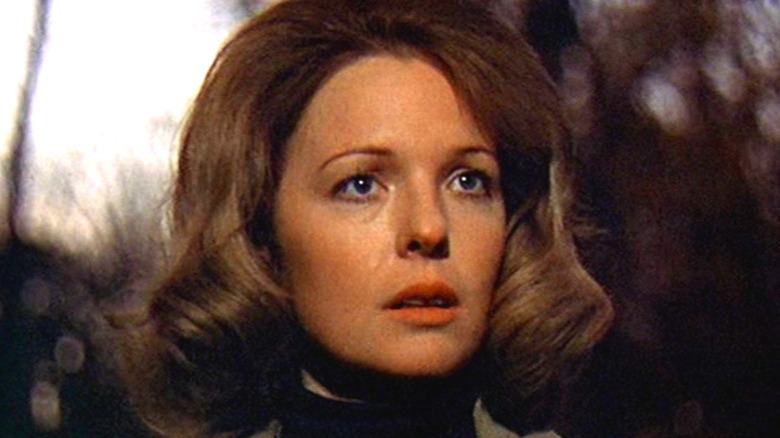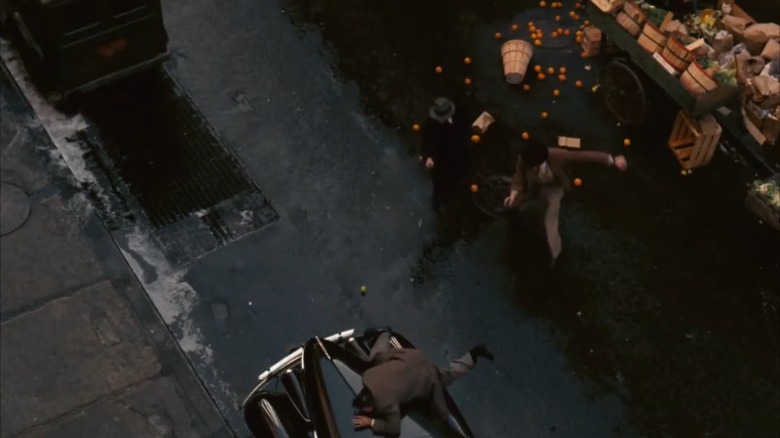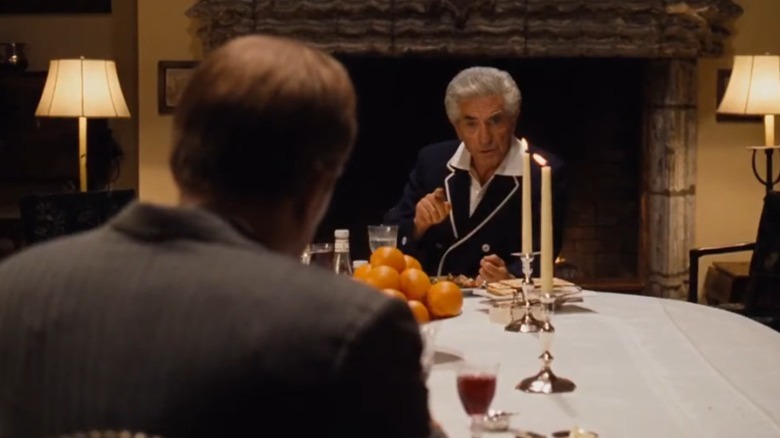Why The Oranges In The Godfather Mean More Than You Think
You may have heard of a little film called "The Godfather."
Nowadays, as we near the 50th anniversary of Francis Ford Coppola's seminal crime epic, it's sometimes easier to think of it as the mighty, untouchable cultural monument that it has become over the years, as opposed to a proper film that you can actually sit down and watch. But anyone who has seen "The Godfather" can attest that, if you do sit down and watch it, it reveals itself as an incredibly engrossing and emotionally affecting movie on a basic, popcorn-munching level. Unlike other highbrow film classics like Ingmar Bergman's "Persona" and Stanley Kubrick's "2001: A Space Odyssey," "The Godfather" is less celebrated for any innovations and experiments it may have introduced into the conventional cinematic storytelling model than for the richness, profundity and efficiency it infused that model with. It's a straightforward crime drama refined to the utmost level of perfection: A meticulously engaging watch in the moment that becomes enormous, though-provoking, and overwhelming, upon further reflection.
To say that a lot has been written about the subtle notes on character, theme and history peppered throughout the film would be an understatement. "The Godfather" is, perhaps, the most discussed and dissected American film of all time. But still, it is so rich that you never really stop noticing new details and sly strokes of genius in it. As a case in point, you might not know that oranges are considered a deeply important symbol in the film.
The oranges are traditionally interpreted as symbols for death
Food is, of course, a major element in the tapestry of Italian American life from the mid-20th century, as depicted by "The Godfather." The Corleones and their acolytes are constantly seen eating and drinking, either together or alone.
However, a particularly important grocery item in the movie tends to be oranges. Early on in the film, just before the infamous scene in which Jack Woltz (John Marley) finds a horse's head under the sheets on his bed, we see Jack having dinner with Tom Hagen (Robert Duvall), and a bowl of oranges is prominently featured at the center of the table.
Sometime later, when Vito Corleone (Marlon Brando) is gunned down in the middle of the street, he knocks over a merchant's basket full of oranges and drops the bag of oranges he's just bought. The oranges scatter across the street as he falls to the ground. Then, near the end of the movie, a recovered Vito is in his estate's backyard, eating an orange and using its rind to make scary faces to entertain his grandson (Anthony Gounaris). And it's right then and there that he suffers the heart attack that does him in.
Given the prominence and recurrence of the oranges, many critics and fans have, over the years, been struck by them as visual manifestations of death's specter. The reading certainly makes a lot of sense. When the merchant's oranges spill out hastily onto the street, chaotic and bright-colored, it's as if you can see the life "spilling out" of Vito.
The symbolism wasn't necessarily intended by the filmmakers
The symbolism of oranges as a signifier of death and doom is pretty widely accepted among fans of the film. And yet, per Time, cultural historian Harlan Lebo, in his extensive making-of book "The Godfather Legacy," wrote that the oranges didn't necessarily symbolize death on purpose. "For [production designer] Dean Tavoularis," Lebo wrote, "oranges were simply another carefully chosen compliment to otherwise somberly dressed sets. 'We knew this film wasn't going to be about bright colors, and oranges make a nice contrast,' said Tavoularis. 'I don't remember anybody saying, Hey, I like oranges as a symbolic message.'"
It's true that the oranges make a nice contrast with the palette of muted reds, yellows and browns that dominate "The Godfather." But it is also true that they became strongly imbued with symbolism in the final product, even if by happenstance. Readings of art don't necessarily have to conform to the creators' intentions — especially in the case of movies, which are so brimming with visual and aural information that each given viewer will have a completely unique experience. You don't have to look at the oranges and think of death, but you don't have to not do that, either.
Plus, for what it's worth, Coppola and Mario Puzo's original script does specifically mention that "the don gets some oranges and a green pepper" from the merchant before his shooting. So, we know that Coppola had at least some oranges in mind when planning things out.


